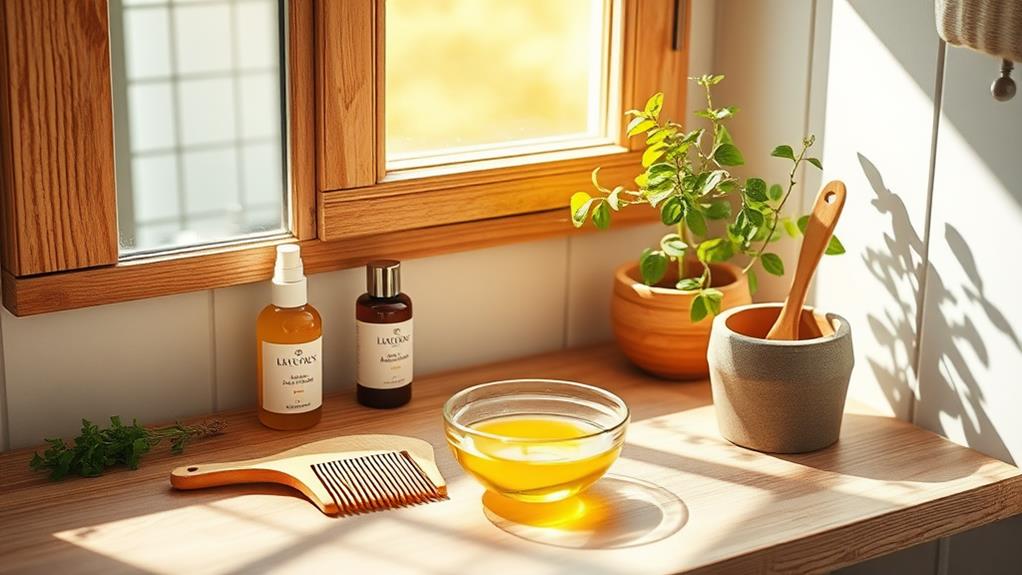If you've noticed your hair isn't growing as quickly as you'd like, it might be time to reassess your routine. You can make simple adjustments in your diet and hair care practices that can greatly impact growth. From incorporating specific nutrients to exploring advanced treatments, there are numerous strategies to contemplate. By the end, you might just find the right combination that works for you. Curious what these effective tips are and how they can transform your hair health? Let's explore them further.
Maintain a Balanced Diet

To maintain healthy hair growth, it's essential that you focus on a balanced diet. A well-rounded diet plays a significant role in supporting hair growth and can help prevent shedding. Aim for at least 50 grams of protein daily, as this is important for strengthening your hair.
Include omega-3 fatty acids, found in fish and flaxseeds, which help nourish your scalp and maintain healthy hair follicles.
Don't forget about vitamins B and D—these nutrients are key players in promoting growth. Iron-rich foods, like leafy greens and lean meats, are also crucial because a deficiency can lead to anemia and increased hair loss.
To combat oxidative stress, include plenty of fruits and vegetables in your meals; these antioxidants protect your hair's vitality.
Lastly, foods high in biotin, such as eggs and nuts, support the structural integrity of your hair. A biotin deficiency is linked to hair loss, so make sure you include these in your diet.
Avoid Restrictive Diets
Restrictive diets might seem appealing for quick weight loss, but they can seriously affect your hair health. When you cut out essential food groups, you risk nutritional deficiencies that can hinder hair growth. A well-balanced diet is essential, providing at least 50 grams of protein daily. Low-protein diets are linked to hair loss and weakened hair structure, so make certain you're getting enough of this key nutrient.
Key nutrients like iron, zinc, and omega fatty acids are critical for maintaining healthy hair follicles. Without these, you may experience increased shedding and impaired growth.
It's important to understand that sudden weight changes can also trigger hair loss, as your body prioritizes essential functions over hair health.
Instead of falling for the latest fad diet, focus on sustainable eating plans that support both your overall health and hair growth. Consulting with a dietitian can help you create a personalized approach that guarantees you avoid restrictive diets.
Incorporate Helpful Supplements
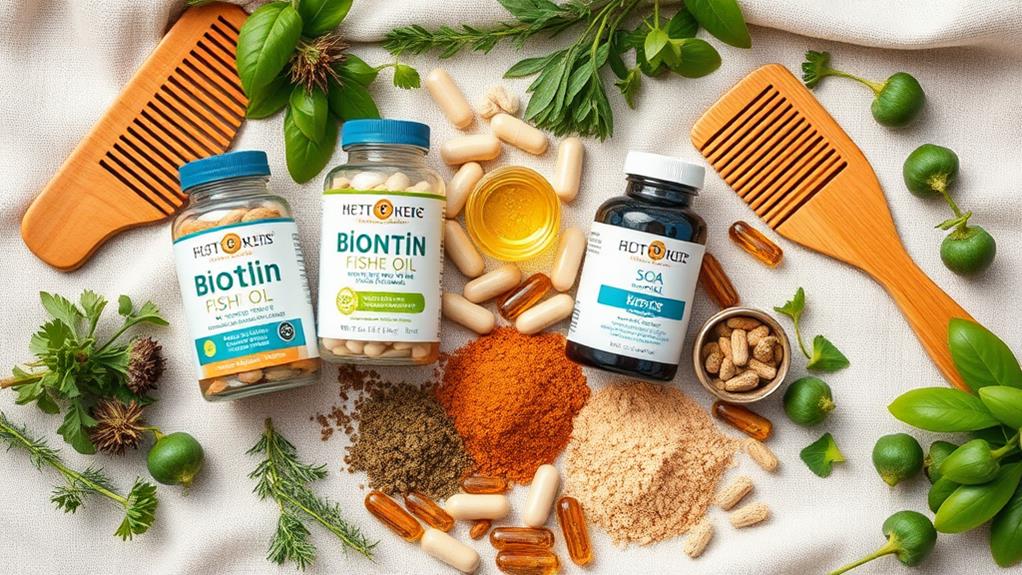
Incorporating helpful supplements into your routine can considerably boost your hair health. One of the most essential supplements is biotin, a significant vitamin that can enhance hair growth and strength. Aim for a daily intake of 30-100 micrograms to see positive effects.
Don't overlook omega-3 fatty acids either; found in fish oil, they can improve hair density. A daily intake of 250-500 milligrams of EPA and DHA is recommended for the best results.
Iron supplementation is another key player, especially since low iron levels can lead to thinning hair. Women should aim for 18 milligrams a day, while men need about 8 milligrams.
Zinc is also important for hair tissue growth and repair, so consider a daily intake of 11 milligrams for men and 8 milligrams for women.
Lastly, adding probiotics to your diet can promote a healthy gut microbiome, which is linked to hair growth. Incorporating 1-10 billion CFUs from various strains can enhance nutrient absorption, further supporting your hair health.
With these supplements in your routine, you'll be on your way to healthier, fuller hair!
Practice Scalp Massages
Scalp massages are a simple yet effective way to boost your hair health and promote growth. By incorporating scalp massages into your daily routine, you can enhance blood circulation to your hair follicles, which may lead to thicker hair and improved scalp health.
Just a few minutes each day can stimulate hair growth and improve nutrient delivery to your scalp, making your hair stronger and healthier.
Regular scalp massages don't just benefit your hair; they also offer stress reduction. Lowering stress levels is essential since stress can contribute to hair loss.
Studies have shown that participants who practiced scalp massages reported up to a 69% improvement in hair thickness and overall health, which is impressive!
To get the most out of your scalp massages, consider using scalp massaging tools like brushes or simply your fingertips. These tools can make the process more enjoyable while maximizing the benefits for hair growth.
Limit Heat Styling
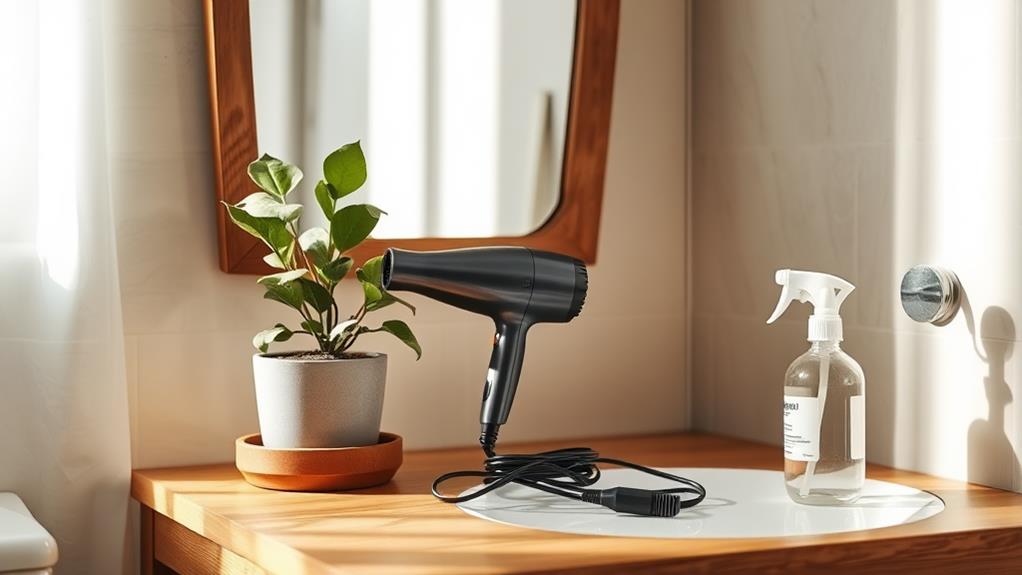
Taking care of your hair goes beyond just massages; it also involves being mindful of how you style it. One important step is to limit heat styling. Excessive use of styling tools can damage your hair and hinder its growth. Try to keep heat styling to just a few times a week.
Always remember to apply a heat protectant before you start using hot tools. This simple step can greatly reduce hair breakage, keeping your strands healthy and strong.
When you do decide to style your hair, opt for the coolest setting available on your tools. This minimizes heat exposure and helps maintain hair integrity. Plus, working quickly while styling can further reduce the amount of time your hair is subjected to damaging heat.
Regular trims are also essential. They help remove split ends caused by heat damage, preventing further breakage and supporting healthier growth.
Choose Gentle Hair Colors
Choosing the right hair color can make a significant difference in your hair's health and growth. When selecting hair colors, try to choose shades close to your natural color. This approach minimizes damage since less aggressive peroxide is required for subtle changes, helping to preserve your hair's structure.
Permanent hair dyes can strip away natural fatty acids, leading to weakened strands and increased breakage. Instead, consider using semi-permanent or ammonia-free options that are gentler on your hair.
It's essential to conduct a spot test before applying any dye to avoid adverse reactions. Scalp irritation can contribute to hair loss, so being cautious is key. If you're unsure, professional color treatments can be a safer choice. Skilled stylists often utilize techniques and products that protect your hair's integrity during the coloring process.
After coloring, don't forget to pamper your hair with regular conditioning treatments. These treatments help restore moisture and strength to chemically treated hair, promoting healthy growth and reducing breakage.
Get Regular Hair Trims
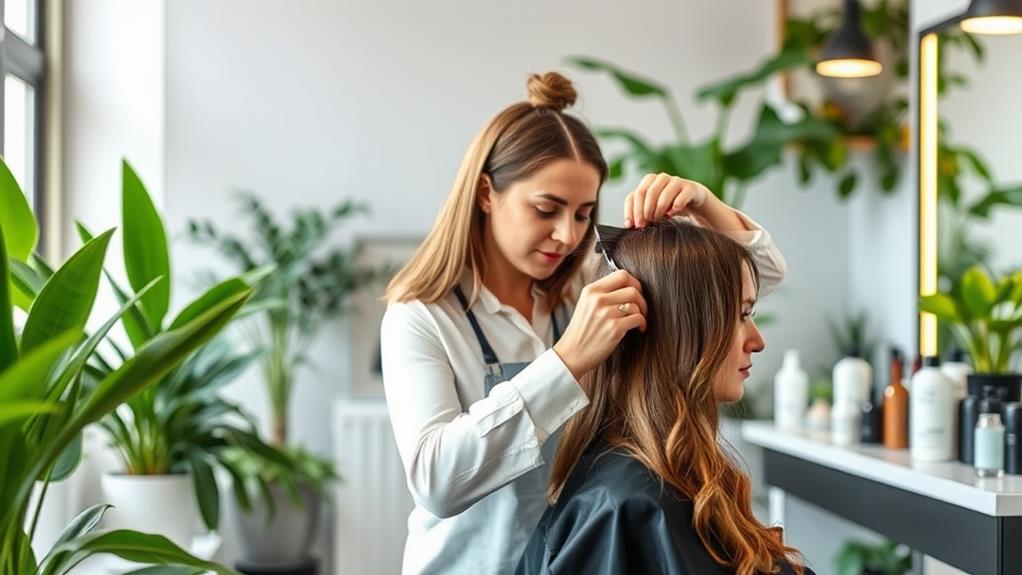
Regular trims every three months can make a world of difference in your hair's health and growth. When you get regular trims, you're not just keeping your style fresh; you're also removing split ends that can travel up the hair shaft and cause breakage. This damage can really hinder healthier hair growth.
By trimming about 1/4 inch, you can maintain length while preventing further issues that might lead to larger cuts down the line.
Keeping your hair free from split ends also contributes to an appearance of thicker hair, making it look and feel more vibrant. Consistent trimming supports your hair's natural growth cycle, allowing it to flourish with overall robustness.
When you prioritize regular trims, you're not just caring for your hair; you're investing in its future.
Manage Stress Levels
While keeping your hair trimmed is crucial for its health, managing stress levels is equally important for fostering hair growth. Chronic stress can push your hair follicles into a resting phase, which may lead to issues like hair shedding and even conditions such as alopecia areata.
To combat stress, consider incorporating techniques like mindfulness meditation, yoga, or deep-breathing exercises into your daily routine. These practices can considerably lower your stress levels, positively impacting your hair growth.
Regular physical exercise is another excellent way to reduce stress. It not only helps you feel more relaxed but also boosts blood circulation, ensuring your hair follicles receive the crucial nutrients and oxygen they need for healthier growth.
Additionally, getting quality sleep plays a crucial role, as it helps produce melatonin, a hormone that supports hair growth and overall well-being.
Don't underestimate the power of a strong support system, either. Surrounding yourself with friends, family, or even seeking professional therapy can provide emotional relief, helping you manage stress-related hair loss more effectively.
Handle Hair With Care
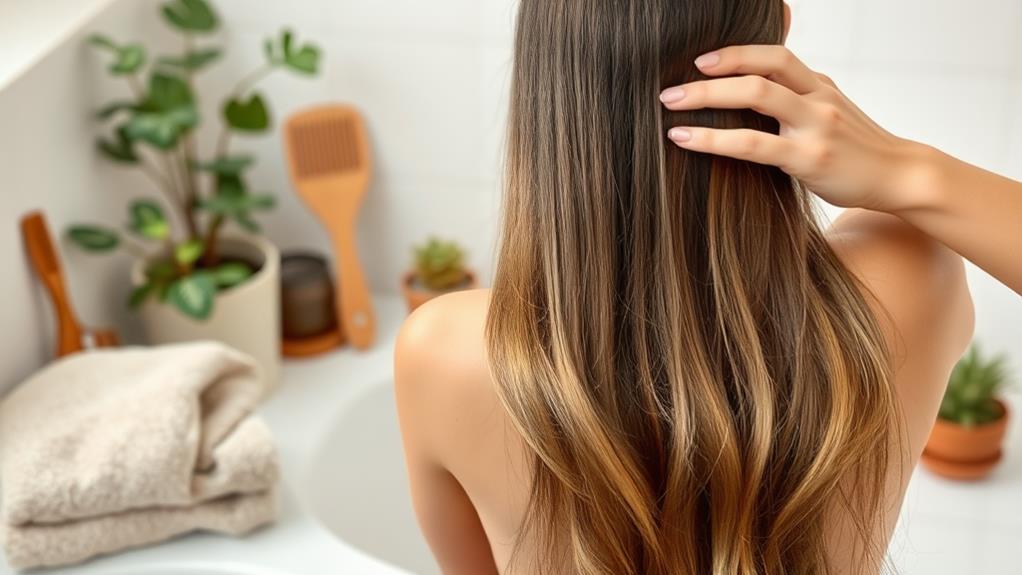
Handling your hair with care is essential for maintaining its health and promoting growth. If you have fragile hair, it's important to adopt gentle routines to prevent damage.
Limiting how often you wash your hair can help keep it from over-drying, which is a common issue. When your hair is wet, avoid brushing it; instead, use a wide-tooth comb to gently detangle damp strands. This will reduce breakage and keep your hair looking healthy.
Regular trims every three months can also make a big difference. They help remove split ends and prevent further breakage, supporting overall hair growth.
Additionally, tight hairstyles like ponytails and braids can stress your hair roots, so try to avoid them to prevent traction alopecia.
Consider incorporating hot oil treatments into your routine too. These treatments can nourish your hair and scalp, providing essential nutrients that strengthen your locks against damage from styling and environmental factors.
Protect Hair During Sleep
Protecting your hair during sleep is just as important as how you care for it during the day. One great way to do this is by switching to satin or silk pillowcases. These materials reduce friction, which helps prevent hair breakage, keeps your hair's moisture intact, and minimizes frizz.
If you have textured or long hair, consider wearing a satin bonnet or scarf while sleeping. This simple step can protect your hair from tangling and damage.
Another tip is to loosely braid or bun your hair before bed. This not only helps avoid tangling but also allows for gentle movement throughout the night, reducing the risk of breakage.
Remember to change your pillowcases and bonnets regularly. Doing so keeps your hair environment clean, which lowers the chances of product buildup and irritation.
Use Conditioning Treatments
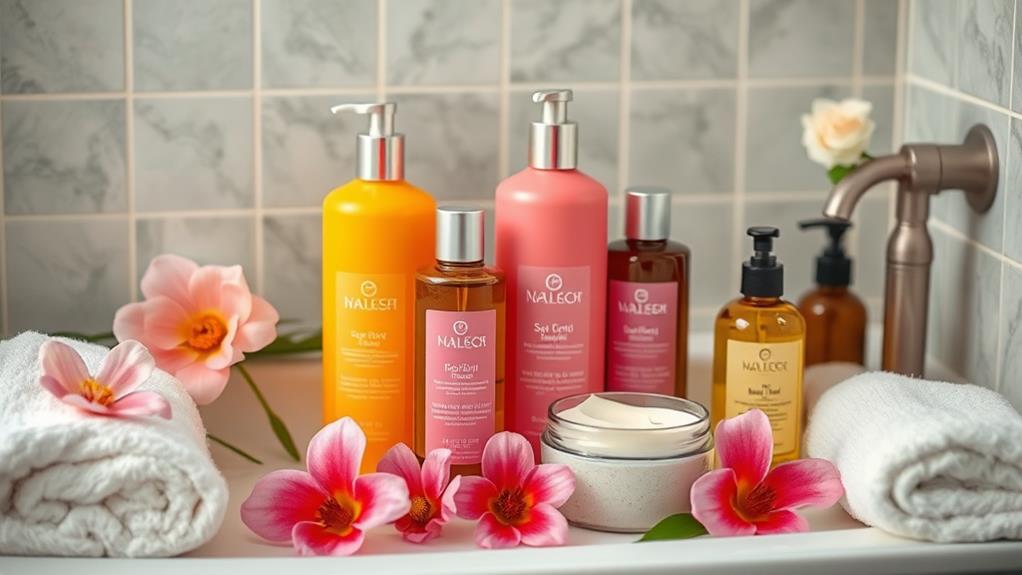
How can you guarantee your hair stays healthy and vibrant? One of the best ways is to use conditioning treatments regularly. These hair care products help promote healthy hair growth by providing essential moisture and protection.
When you condition your hair, you improve its overall health and manageability, making it easier to style without causing breakage.
For fine hair, apply conditioner only to the ends to avoid weighing it down while still giving those strands the hydration they need. Deep conditioning treatments, done weekly or bi-weekly, can greatly enhance hydration and repair damaged hair, supporting healthier growth.
These treatments work wonders for your scalp, ensuring it stays nourished and ready for new hair growth.
Don't forget about leave-in conditioners! They offer ongoing moisture and protection throughout the day, helping to prevent split ends and breakage.
Stay Hydrated
Conditioning treatments are a fantastic start, but to truly boost your hair's health and growth, staying hydrated is key. When you stay hydrated, you help maintain ideal scalp moisture, which is vital for healthy hair follicles. Dehydration can lead to dry and brittle hair, making it more prone to breakage.
To support hair growth, aim for at least 8 glasses, or 64 ounces, of water each day. Of course, your individual hydration needs may vary based on your activity level, climate, and overall health.
In addition to drinking water, incorporating water-rich foods like cucumbers, oranges, and leafy greens into your diet can greatly contribute to your hydration levels. These foods not only keep you hydrated but also provide essential nutrients like vitamins and minerals that support healthy hair.
Consistent hydration guarantees that your hair follicles receive the nutrients they need for growth and maintenance. So, make it a habit to drink water throughout the day and enjoy those invigorating snacks. Your hair will thank you, and you'll feel great, too!
Stay hydrated, and watch your hair flourish!
Explore Advanced Treatments
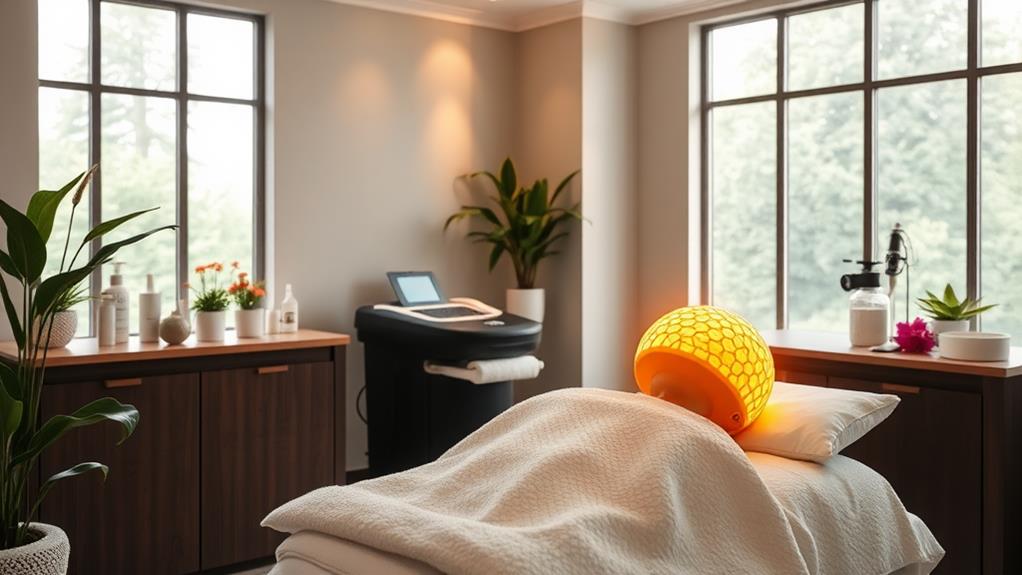
Exploring advanced treatments for hair growth can open up new possibilities for those struggling with thinning hair or hair loss. One popular option is PRP therapy, where your own platelets are injected into the scalp. This method may accelerate hair growth and usually requires monthly sessions for three months to see results.
Another effective technique is microneedling, which creates tiny punctures in your scalp. This process enhances the effectiveness of topical treatments, like minoxidil, promoting better absorption and stimulating hair follicles.
You might also consider essential oils, such as rosemary and pumpkin seed oil. These oils have shown potential in studies for stimulating hair growth when applied topically.
Light therapy devices, utilizing red and blue light, can also help by improving blood circulation and reducing inflammation in the scalp.
Finally, acupuncture is worth exploring as an alternative treatment. It may promote hair growth by improving blood flow and reducing stress levels associated with hair loss.
Incorporating these advanced treatments can greatly boost your scalp health and overall hair growth potential. So, why not give them a try and see what works best for you?
